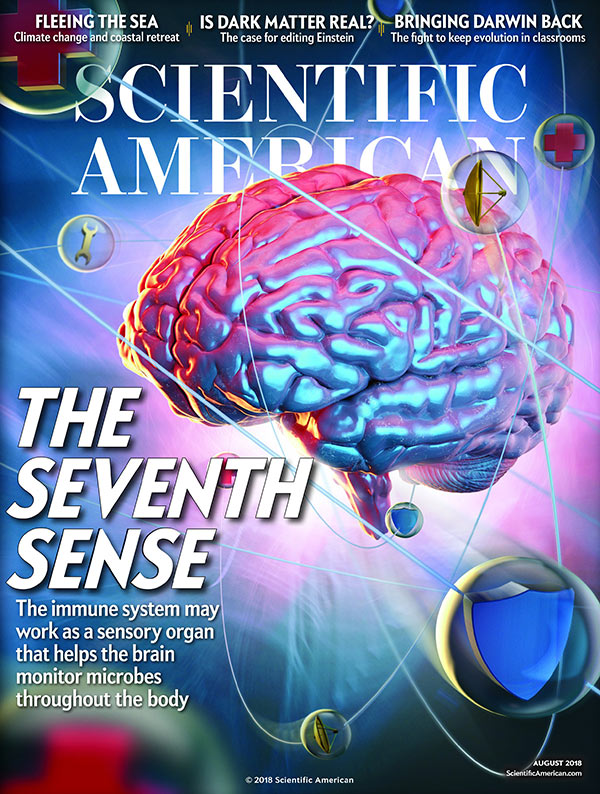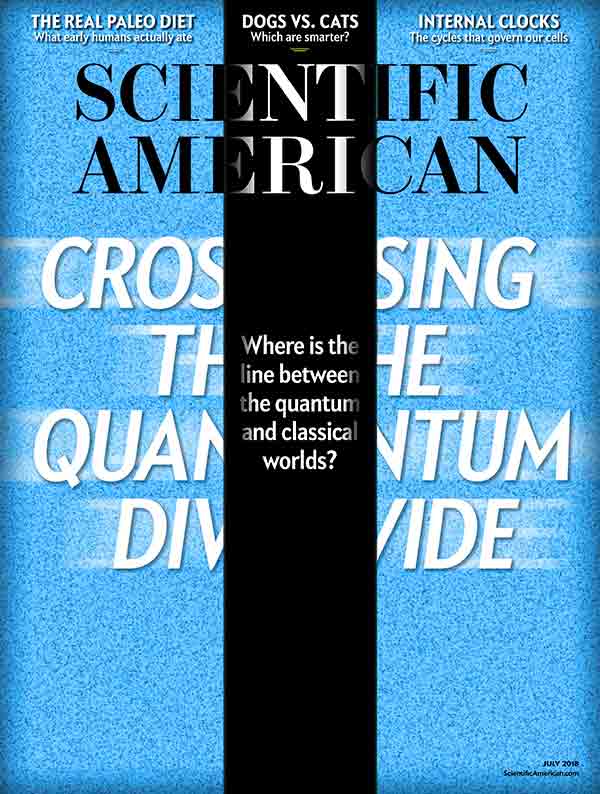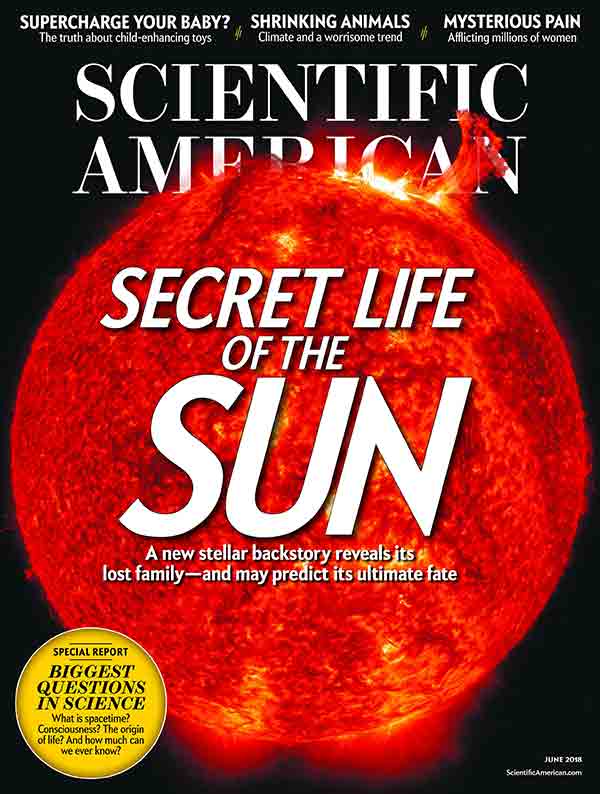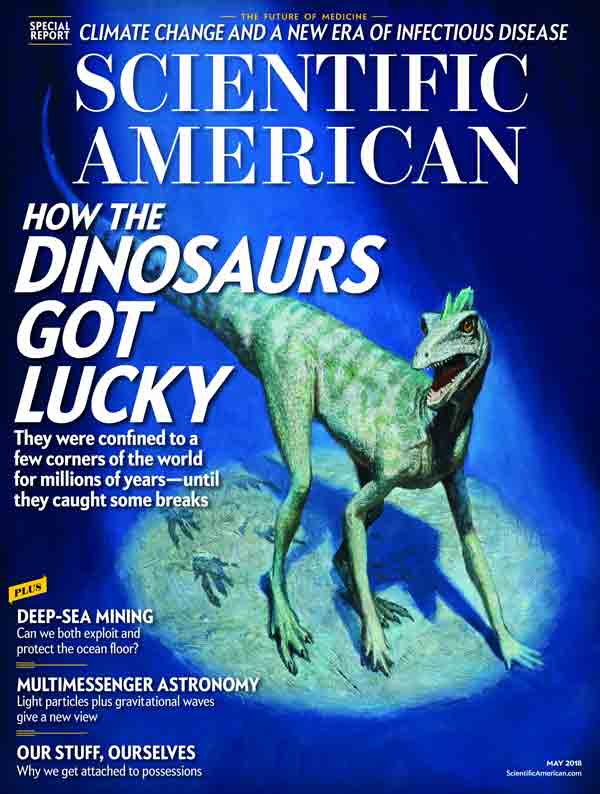August 1, 2018
The limitations of personal genome service testing
Like a lot of baby boomers, I find myself gravitating to newspaper obits, cross-checking ages and causes of death with my current health parameters, most notably heart disease (which felled my father and grandfather) and cancer (which slew my mother). And then there is Alzheimer’s disease, which a 2015 report by the Alzheimer’s Association projects will destroy the brains of more than 28 million baby boomers. Given the importance of family history and genetics for longevity, I plunked down $199 for a 23andMe Health + Ancestry Service kit, spit into the little plastic vial, opted in for every test available for disease gene variants and anxiously awaited my reports. How’d they do?
First, the company captured my ancestry well at 99.7 percent European, primarily French/German (29.9 percent), British/Irish (21.6 percent), Balkan/Greece (16.4 percent) and Scandinavian/ Sweden (5.5 percent). My maternal grandmother is German and grandfather Greek; my fraternal great-grandparents were from Sweden and Denmark.
Second, the traits report correctly predicted that I can smell asparagus in my urine, taste bitter and have hazel eyes, ring fingers longer than index fingers, little freckling and straight, light hair. Third, for the disease reports, my eye lit on the phrase “variants not detected” for Parkinson’s, cystic fibrosis, muscular dystrophy, sickle cell anemia, Tay-Sachs and, most concernedly, Alzheimer’s. “Oh joy, oh rapture unforeseen!” (Thank you, Gilbert and Sullivan.) (continue reading…)
July 1, 2018
Are consciousness, free will and God insoluble mysteries?
In 1967 British biologist and Nobel laureate Sir Peter Medawar famously characterized science as, in book title form, The Art of the Soluble. “Good scientists study the most important problems they think they can solve. It is, after all, their professional business to solve problems, not merely to grapple with them,” he wrote.
For millennia, the greatest minds of our species have grappled to gain purchase on the vertiginous ontological cliffs of three great mysteries—consciousness, free will and God—without ascending anywhere near the thin air of their peaks. Unlike other inscrutable problems, such as the structure of the atom, the molecular basis of replication and the causes of human violence, which have witnessed stunning advancements of enlightenment, these three seem to recede ever further away from understanding, even as we race ever faster to catch them in our scientific nets.
Are these “hard” problems, as philosopher David Chalmers characterized consciousness, or are they truly insoluble “mysterian” problems, as philosopher Owen Flanagan designated them (inspired by the 1960s rock group Question Mark and the Mysterians)? The “old mysterians” were dualists who believed in nonmaterial properties, such as the soul, that cannot be explained by natural processes. The “new mysterians,” Flanagan says, contend that consciousness can never be explained because of the limitations of human cognition. I contend that not only consciousness but also free will and God are mysterian problems—not because we are not yet smart enough to solve them but because they can never be solved, not even in principle, relating to how the concepts are conceived in language. Call those of us in this camp the “final mysterians.” (continue reading…)
June 1, 2018
Google as a window into our private thoughts
What are the weirdest questions you’ve ever Googled? Mine might be (for my latest book): “How many people have ever lived?” “What do people think about just before death?” and “How many bits would it take to resurrect in a virtual reality everyone who ever lived?” (It’s 10 to the power of 10123.) Using Google’s autocomplete and Keyword Planner tools, U.K.-based Internet company Digitaloft generated a list of what it considers 20 of the craziest searches, including “Am I pregnant?” “Are aliens real?” “Why do men have nipples?” “Is the world flat?” and “Can a man get pregnant?”
This is all very entertaining, but according to economist Seth Stephens-Davidowitz, who worked at Google as a data scientist (he is now an op-ed writer for the New York Times), such searches may act as a “digital truth serum” for deeper and darker thoughts. As he explains in his book Everybody Lies: Big Data, New Data, and What the Internet Can Tell Us About Who We Really Are (Dey Street Books, 2017), “In the pre-digital age, people hid their embarrassing thoughts from other people. In the digital age, they still hide them from other people, but not from the internet and in particular sites such as Google and PornHub, which protect their anonymity.” Employing big data research tools “allows us to finally see what people really want and really do, not what they say they want and say they do.” (continue reading…)
May 1, 2018
Utilitarianism and its discontents
Would you cut off your own leg if it was the only way to save another person’s life? Would you torture someone if you thought it would result in information that would prevent a bomb from exploding and killing hundreds of people? Would you politically oppress a people for a limited time if it increased the overall well-being of the citizenry? If you answered in the affirmative to these questions, then you might be a utilitarian, the moral system founded by English philosopher Jeremy Bentham (1748–1832) and encapsulated in the principle of “the greatest good for the greatest number.”
Modern utilitarianism is instantiated in the famous trolley thought experiment: You are standing next to a fork in a trolley track and a switch to divert a trolley car that is about to kill five workers unless you throw the switch and divert the trolley down a side track where it will kill one worker. Most people say that they would throw the switch—kill one to save five. The problem with utilitarianism is evidenced in another thought experiment: You are a physician with five dying patients and one healthy person in the waiting room. Would you harvest the organs of the one to save the five? If you answered yes, you might be a psychopathic murderer.
In a paper published online in December 2017 in the journal Psychological Review entitled “Beyond Sacrificial Harm,” University of Oxford scholars Guy Kahane, Jim A. C. Everett and their colleagues aim to rehabilitate the dark side of utilitarianism by separating its two dimensions: (1) “instrumental harm,” in which it is permissible to sacrifice the few to benefit the many, and (2) “impartial beneficence,” in which one would agree that “it is morally wrong to keep money that one doesn’t really need if one can donate it to causes that provide effective help to those who will benefit a great deal.” You can find out what type you are by answering the nine questions in the authors’ Oxford Utilitarianism Scale. I scored a 17 out of a possible 63, which was at the time described as meaning “You’re not very utilitarian at all. You Kant be convinced that maximising happiness is all that matters.” (continue reading…)
April 1, 2018
The rise of the atheists

In recent years much has been written about the rise of the “nones”—people who check the box for “none” on surveys of religious affiliation. A 2013 Harris Poll of 2,250 American adults, for example, found that 23 percent of all Americans have forsaken religion altogether. A 2015 Pew Research Center poll reported that 34 to 36 percent of millennials (those born after 1980) are nones and corroborated the 23 percent figure, adding that this was a dramatic increase from 2007, when only 16 percent of Americans said they were affiliated with no religion. In raw numbers, this translates to an increase from 36.6 million to 55.8 million nones. Though lagging far behind the 71 percent of Americans who identified as Christian in the Pew poll, they are still a significant voting block, far larger than Jews (4.7 million), Muslims (2.2 million) and Buddhists (1.7 million) combined (8.6 million) and comparable to politically powerful Christian sects such as Evangelical (25.4 percent) and Catholic (20.8 percent).
This shift away from the dominance of any one religion is good for a secular society whose government is structured to discourage catch basins of power from building up and spilling over into people’s private lives. But it is important to note that these nones are not necessarily atheists. Many have moved from mainstream religions into New Age spiritual movements, as evidenced in a 2017 Pew poll that found an increase from 19 percent in 2012 to 27 percent in 2017 of those who reported being “spiritual but not religious.” Among this cohort, only 37 percent described their religious identity as atheist, agnostic or “nothing in particular.”
Even among atheists and agnostics, belief in things usually associated with religious faith can worm its way through fissures in the materialist dam. A 2014 survey conducted by the Austin Institute for the Study of Family and Culture on 15,738 Americans, for example, found that of the 13.2 percent who called themselves atheist or agnostic, 32 percent answered in the affirmative to the question “Do you think there is life, or some sort of conscious existence, after death?” Huh? Even more incongruent, 6 percent of these atheists and agnostics also said that they believed in the bodily resurrection of the dead. You know, like Jesus. (continue reading…)






